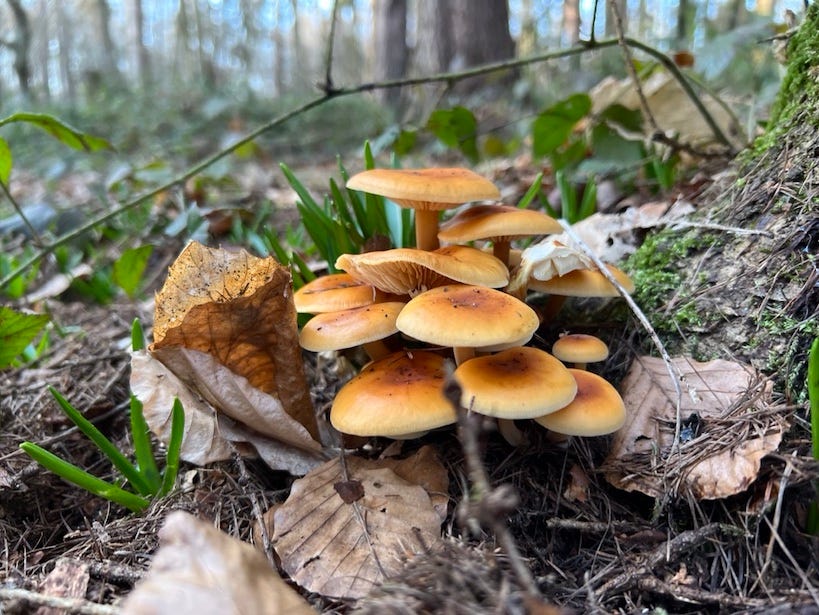The Retirement Newsletter: Suffering from the winter doldrums
Issue Number: -48 — Seasonal Affective Disorder (SAD) — spring will soon be here
Welcome
Welcome to issue -48 — Suffering the winter doldrums.
The good news is that spring will soon be here in the Northern Hemisphere.
The winter doldrums
I’ve never considered myself as someone who suffers from Seasonal Affective Disorder (SAD). Still, as I get older and spend more time outside, I wonder if I experience SAD.
SAD is often referred to as “winter depression”, although some people can get the reverse — symptoms in the summer and fine in the winter.
The UK National Health Service (NHS) lists the symptoms of SAD as follows:
a loss of pleasure or interest in usual activities
a persistently low mood
craving carbohydrates and gaining weight
decreased sex drive
difficulty concentrating
feeling lethargic (lacking in energy) and sleepy during the day
feelings of despair, guilt, and worthlessness
irritability
sleeping for longer than usual and finding it hard to get up in the morning
And I do experience some of the above symptoms during winter.
Over the years, I have worked with some people who suffer from the condition; you could see it impact their lives. As soon as the night started to draw in and the days shortened into the winter months, they became less happy and more withdrawn.
Well, with me, it’s not so much the length of day and the number of hours of daylight that affect me, but the quality of the light.
If we have an extended spell in which we get minimal sun and no blue skies, I feel a bit "down in the dumps".
Give me a few days of clear blue skies and winter sunshine, and I feel much better.
Thinking about it, I guess the first time I noticed this was when I used to go skiing in the winter. After a few days of flat grey light on the slopes, I would start to feel a bit depressed, but after a few days of sunlight and clear blue skies, I felt on top of the world.
Moreover, when I lived closer to the equator, where we didn’t get seasons, the day length was almost constant throughout the year, and nearly every day, it was sunny; the traditional Northern Hemisphere winter months didn’t affect me.
So, what can I do about this?
Well, the NHS website suggests:
antidepressants
change in lifestyle
light therapy
talking therapies
My SAD is not to the level that I need antidepressants or therapy. And I know that the lifestyle changes approach works for me. That is, getting as much sunlight as possible, exercising and managing my stress levels. To this, I add some ‘talking therapy’, but not professional therapy; my therapy consists of walking in the countryside and chatting with a good friend.
I find getting outside, walking and chatting helps.
Wandering through the countryside and seeing views like these, even on grey cloudy days, helps.
And, if the weather is sunny, the therapeutic effects of the walk are even better.
Strolling across a field of sheep on a sunny day with blue skies — the best therapy ever.
And when I am out walking, I look for the first signs of spring — the emergence of new life. And one of the earliest signs of spring in the UK is the appearance of Snowdrops (Galanthus nivalis).
Snowdrops (Galanthus nivalis) are considered the ‘herald’ of spring in the UK, but they are not native plants. Some think they were introduced to the UK by nuns and monks from Europe. This could explain the connection between Snowdrops and churches, as Snowdrops seem pretty common in churchyards. Yet, the flowers were first recorded in the UK in the 18th century, so it is more likely they were introduced as garden plants.
One of the earliest native flowering plants in the UK is the Daffodil (Narcissus pseudonarcissus). Seeing them bloom is always a sign that spring is on the way.
And one thing I always keep an eye open for is the appearance of the shoots of Bluebells (Hyacinthoides non-scripta).

And when the Bluebells (Hyacinthoides non-scripta) arrive, it is glorious. Spring is here.
And I have survived another winter.
What are your tricks for getting through the winter months? Why not share your tricks in the comments below?
Useful Links
While these links are for UK-based websites, you may find the information helpful even if you are not based in the UK:
Next week
Next week I will look at travelling in retirement and ask if it would be a side-hustle or a hobby.
Thanks
Thanks for taking the time to read this newsletter, and please don't hesitate to share it with your friends or on social media using the buttons below.
If you would like to say 'thanks' for the newsletter, why not buy me a cup of tea?
Until next time,
Nick
PS, If you have something you would like to contribute to the newsletter — a story, advice, anything — please get in touch.













